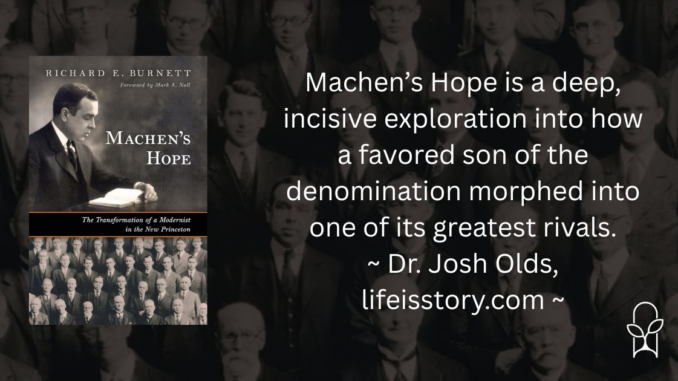
Published by Eerdmans on April 11, 2024
Genres: Non-Fiction, Biography
Buy on Amazon
Goodreads

The first critical biography of J. Gresham Machen, examining the full arc of his intellectual career
J. Gresham Machen is known as a conservative hero of the fundamentalist-modernist controversy. But was he always so staunchly antimodernist?
In this sweeping new biography, Richard E. Burnett examines the whole of Machen’s life and career—from his early years at Princeton, to his experience in the First World War, to his founding of Westminster Theological Seminary . Burnett pays special attention to topics that have received little attention from biographers, like Machen’s crisis of faith and his support for historical criticism of Scripture.
Incorporating all of Machen’s major works as well as his previously unpublished private correspondence, Burnett crafts a nuanced narrative of Machen’s intellectual journey from enthusiastic modernist to stalwart conservative. Nuanced and thorough, Machen’s Hope will challenge scholars’ assumptions about Machen and his dynamic era.
Biographies tend to be written by folks who align with their subjects in some fashion—socially, politically, religiously. There are exceptions, of course, but by and large those who are interested in chronicling an individual’s life and legacy and have access to the resources with which to do so lend themselves to being individuals who have some connection to the person about whom they are writing. Richard E. Burnett’s new biography of J. Gresham Machen—entitled Machen’s Hope—isn’t that. Instead, it’s a viewpoint from an ideologically rival tradition that centers on the events in Machen’s life that led to that rivalry.
Burnett is an ordained minister in the Presbyterian Church (PCUSA) and serves as the director of the MA program in Reformed Theology at Dubuque Theological Seminary, which is also affiliated with the PCUSA. Now, if you know anything about J. Gresham Machen, you know where I’m going with this. Machen grew up in the PCUSA. He was a professor at Princeton Theological Seminary—officially called The Theological Seminary of the Presbyterian Church—for several decades before revolting against its “modernist” theological and founding Westminster Theological Seminary and the Orthodox Presbyterian Church as more “orthodox” educational and denominational alternatives. Machen’s Hope is a deep, incisive exploration into how a favored son of the denomination morphed into one of its greatest rivals.
Biographies of Machen tend to have the revolt and its aftermath as their focus. After all, written by those following in Machen’s tradition, it is the founding and movement into that tradition that captures their attention. Machen’s Hope, however, wants to know where things went wrong. What led Machen to abandon modernist principles? What can contemporary liberal Presbyterians learn from the schism and controversies of a hundred years ago? On the back cover, George Hunsinger, a current Princeton professor, writes an endorsement noting that “US Presbyterians have arguably never fully recovered and have had difficulty finding their way ever since.” Machen’s Hope is an attempt at recovery—to better understand Machen and the fundamentalist/conservative movement he came to lead
Much of Machen’s Hope is taken from Machen’s personal correspondence and a detailed contextual history of Machen’s life. This has the effect of providing both a zoomed-out panorama of Machen’s socio-cultural context and a zoomed-in effect of knowing the precise evolution of Machen’s thoughts. At times, Burnett perhaps gets lost in all the history. Machen disappears in his own story for some time before popping back up. I think some tighter editing could have made this a slimmer volume—or perhaps left space for more of a discussion of Machen’s life post-Princeton.
But in all, Machen’s Hope is a thorough critical biography that examines J. Gresham Machen from a perspective not usually seen. While not an ideological follower, Burnett is irenic and mostly objective. He doesn’t draw many conclusions for the modern Princeton or PCUSA but allows the reader to sit with the complexity of everything. At very least, what Burnett teaches us is that an individual’s evolution of faith and thought is rarely as linear and simplistic as we would often like to think.
